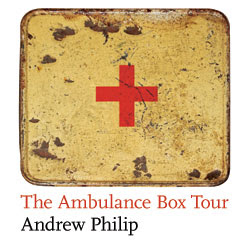 Siriol Troup's Beneath the Rime, her second full collection of poetry, was published earlier this year by the wonderful Shearsman Press. I first met Siriol when we read together at StAnza 2006, along with Richard Price, and was only too pleased when asked to take part in her virtual book tour.
Siriol Troup's Beneath the Rime, her second full collection of poetry, was published earlier this year by the wonderful Shearsman Press. I first met Siriol when we read together at StAnza 2006, along with Richard Price, and was only too pleased when asked to take part in her virtual book tour.
Andrew Philip: It's a pleasure to have you here. at Tonguefire, Siriol. Will you tell a little about how and when you started to write poetry?
Siriol Troup: I had a wonderful English teacher, Miss Flint, who encouraged us all to read and write poetry. Once a term, each house was given a theme to write about and the best efforts were pinned up on the ‘Literary Board’. Other girls would pay me to write poems for them – sometimes there were half a dozen of my poems on the board, each under a different name. After I left school I had little time for poetry – raising four children took a fair amount of my time! – until 2001 when I abandoned work on yet another terrible novel and returned to writing poetry.
AP: The real and imagined journeys in Beneath the Rime cover a lot of ground in place and time. It seems a very European book in that France, Germany, Spain and Rome are recurrent settings, although we also get a bit of America. That breadth of view is refreshing in British poetry. Will you comment on this? Do you see yourself as primarily a British or European poet?
ST: My father was in the army so most of my childhood and teenage years were spent abroad, I then read French and German at Oxford, returned to teach French Literature there for a few years, went on to learn Italian and Spanish, and, more recently, I’ve been learning a bit of ancient Greek and Norwegian – so European languages and literature have always been part of my everyday vocabulary, and I suppose that’s why I’d like to see myself as a European, rather than British, poet. In fact, taking a quick look at the piles on my desk and my bedside table, I’d say I read a lot more in foreign languages (both poetry and prose) than I do in English! The French settings in Beneath the Rime are in fact Belgian: I spent summer holidays living with a family in Brabant who kept rabbits and became the background for a set of five poems in the book, the first of which is “Country Living”.
AP: You make frequent use of the dramatic monologue, sometimes even in non-human voices, such as the elephants in “Nox Elephantorum” and “Caged Elephants”. What attracts you to that approach? What do you consider to be its advantages and disadvantages?
ST: I like the freedom of being able to use a voice that’s not my own. Perhaps it’s something to do with being a linguist, always using someone else’s language. Finding another voice – human, animal or mineral (there’s a poem in my first book, Drowning up the Blue End, written from the point of view of Samuel Pepys’s gall stone) – lets you inhabit a different world, a different time, gives you a chance to see things from other, possibly more interesting, points of view. At its worst, dramatic monologue can simply be a frustrating mask, a cover-up that’s pretentious or annoying, but at its best, it’s a way of approaching the truth obliquely that can be liberating and illuminating, for both writer and reader – think of Plath’s “Lady Lazarus”, or Charlotte Mew’s “The Farmer’s Bride”.
AP: The third section of the book explores imaginatively the circumstances of Velázquez’s court portraits of the Infanta María Teresa and Mariana of Austria. I’m interested in the writing of this sequence. Did the poems arise out of reading you had already done or did you research the background with the intention of writing about it? Did you conceive it as a sequence or did it simply grow into one?
ST: I’ve been passionate about Velázquez since I was a teenager – one of the first art books I ever read was a Phaidon book with colour plates of some of his most famous portraits, including ones of Philip IV of Spain and his children Baltasar Carlos and Margarita, though oddly enough none of María Teresa herself. Since then I’ve read a lot about Velázquez and seen more of his paintings in galleries and exhibitions, most recently in the National Gallery exhibition in 2006, where I stood for a long while in front of the portrait of María Teresa aged about fourteen, wearing a wig decorated with ribbons in the shape of butterflies.
I was intrigued by the unusually intimate relationship that might – must! – have developed between artist and sitter over the years during which Velázquez was court painter and the Infanta was growing up, approaching marriageable age – even more intrigued by the fact that, as Chamberlain of the Royal Palace, Velázquez actually helped organize her wedding to Louis XIV of France and was so exhausted by the ceremonies that he died only two months later, leaving her to an unfaithful husband, children who all, apart from one, died in infancy, and a country that hated her.
I did a lot of background research about the Infanta and also about Velázquez and his painting techniques, always intending that what I wrote would form a sequence with a narrative thread, though I didn’t realise until quite far into my research that the poems would be in the Infanta’s voice. Once I’d done the reading and found her voice, I wrote very quickly – it was hard knowing when to stop, even harder leaving her behind and moving on to other subjects.
AP: That’s a long gestation, if the interest goes back to your teens. Do you generally find it takes considerable time for poems to germinate or do you tend to work quite quickly?
ST: Once I have an idea for a poem, I usually write the first draft quite quickly, but it can then take me months, even years, to finish it. There’s a poem in my first book which I wrote during take-off on a flight from Newcastle to London, but that’s the exception rather than the rule. I like to leave poems alone for a long while before coming back to them, then I can see more clearly what needs to be done and be ruthless about doing it.
AP: Beneath the Rime is a beautifully produced book. What attracted you to Shearsman and how did you find working with Tony Frazer?
ST: I’d already been impressed by Shearsman’s list (which includes César Vallejo, Gael Turnbull, Fernando Pessoa, Lutz Seiler...) and seen Tony in action at some of the Shearsman readings at the Swedenborg Hall in London. He’s passionate about all kinds of poetry and, for me, a big attraction was his interest in and enormous knowledge about German poetry, which he also translates. As a publisher, he’s perceptive, efficient, approachable, decisive – everything you could hope for. The cover for Beneath the Rime is all down to him. When the first image we looked at turned out to have been used elsewhere, he immediately put together five new covers for me to choose from, any one of which would have been a pleasure to use.
AP: How does it feel to be on your second collection? Is it harder work or easier than your first?
ST: It feels great to have my second collection out, but it was definitely harder work than my first. The more I write – and the more I read – the more I realise how far I fall short.














.jpg)





